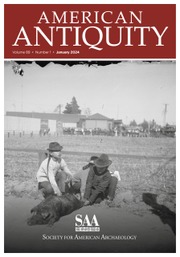Article contents
Additional Evidence of Scalping1
Published online by Cambridge University Press: 25 January 2017
Extract
Interest in the evidence of early scalping in aboriginal America was stimulated by Georg K. Neumann in an article which appeared in American Antiquity. Since then, another specimen coming from prehistoric Middle Mississippi horizons a t Mound State Monument, has been described.
It came to my attention, quite accidentally, that a specimen from the Earth Mound Ruins, Nebraska, described by HrdliCka, presents such a markedly similar appearance to that found at Moundville, that a comparison of the two is in order.
- Type
- Facts and Comments
- Information
- Copyright
- Copyright © The Society for American Archaeology 1942
Footnotes
Grateful acknowledgment is made to the Alabama Museum of Natural History and the Works Projects Administration of Alabama for assistance in the preparation of this note.
References
2 Neumann, Georg K., “Evidence for the Antiquity of Scalping from Central Illinois,” American Antiquity, Vol. 5, No. 4, 1940, pp. 287–289 Google Scholar.
3 Charles E. Snow, “Possible Evidence of Scalping at Moundville,” Part II, Museum Paper 15, Geological Survey of Alabama. In Press.
4 Gilder, Robert F., “Excavation of Earth Lodge Ruins in Eastern Nebraska,” with a “Report on the Skeletal Remains” by Aleš Hrdlička. American Anthropologist, Vol. 11, No. 1, 1909, pp. 56–84 CrossRefGoogle Scholar.
5 Ibid., pp. 82–83.
- 8
- Cited by


